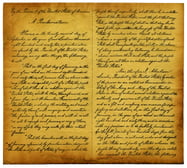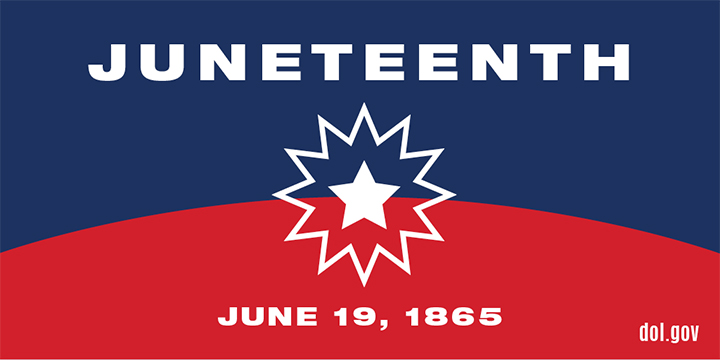The Office of Federal Contract Compliance Programs celebrates and commemorates Juneteenth (officially Juneteenth National Independence Day, also known as “Jubilee Day”), the most popular annual celebration of emancipation from slavery in the United States.
Juneteenth commemorates June 19, 1865, when Union Major General Gordon Granger read General Order No. 3, “The people of Texas are informed that, in accordance with a proclamation from the Executive of the United States [President Abraham Lincoln], all slaves are free. This involves an absolute equality of personal rights and rights of property between former masters and slaves…” Texas was the most remote of the slave states, and with a low presence of Union troops, enforcement of the Emancipation Proclamation that had formally freed enslaved people almost two and a half years earlier had been slow and inconsistent. The newly “freed” black Americans of Texas rallied around this date and transformed June 19th from a day of unheeded military orders into their own annual ceremony.
The Texas Legislature passed a law establishing this day as a holiday, making Texas the first state to establish Juneteenth as an official state holiday. Juneteenth is now recognized as a federal and state holiday or special day of observance in 47 of the 50 U.S. states. At the June 2021signing of the Juneteenth National Independence Day Act, President Biden stated:
By making Juneteenth a federal holiday, all Americans can feel the power of this day, learn from our history, celebrate progress, and grapple with the distance we have come, but the distance we still have to travel. Juneteenth not only commemorates the past. It calls for action today.
On day one of his administration, President Biden made racial equity a core pillar of his agenda, issuing Executive Order 13985 setting forth the Administration’s policy of “[a]ffirmatively advancing equity, civil rights, racial justice, and equal opportunity.” COVID-19’s disproportionate impact on underserved communities, the growing recognition of systemic inequality, and calls for racial justice have brought national attention to the unfinished business of equal opportunity. This Juneteenth, OFCCP recommits to ensuring an equitable future for workers.
OFCCP’s mission is to protect workers, promote diversity through equal employment opportunity, and enforce the legal and contractual promise of nondiscrimination and affirmative action applicable to federal contractors and subcontractors. OFCCP plays a critical role in tackling employment policies and practices that create barriers to opportunity and perpetuate inequality.
For over half a century, OFCCP has helped define and defend equal opportunity in the American workplace, and we will continue to do so in the years ahead.
Additionally, some little-known facts about Juneteenth are as follows:
- The Pen of Liberty, Hampton’s pen is one of three pens of identical construction that President Abraham Lincoln used in 1862 and 1863 to sign the three proclamations which emancipated enslaved African Americans. This pen was used to sign the first of these three pieces of legislation. On April 16, 1862, President Lincoln signed the first document, “An Act for the Release of certain Persons held to Service or Labor in the District of Columbia,” which declared the slaves of Washington, D.C. free. The second pen was used on June 19, 1862, when Lincoln signed a document to free the slaves in the territories of the United States (Nebraska, Colorado, North Dakota, South Dakota, Wyoming, Montana, Idaho, Washington, Utah, Nevada, and New Mexico). The final Emancipation Proclamation was signed on January 1, 1863.
- Emancipation Oak, located near the entrance of Hampton University’s campus, served as one of the first classrooms for newly freed African American men and women eager for an education. In 1863, the Butler School was constructed next to the oak, and later that year, the black community gathered to hear a prayer answered. The Emancipation Oak became the site of the first Southern reading of President Lincoln’s Emancipation Proclamation, an act that accelerated the demand for the education of African Americans.
- Emancipation Park, has been the site of community and family celebrations for African Americans in Houston. Emancipation Park occupies one full 10-acre city block and still houses many of its original structures and natural features. As the site for the Original Juneteenth Celebration in 1866, and one of the first parks in America purchased by African Americans specifically for this event, Emancipation Park stands today as an important symbol and a turning point in the history of the United States.

A parchment replica of page one of the Emancipation Proclamation which President Abraham Lincoln issued on January 1, 1863. The proclamation freed slaves that were held in states that seceded from the Union.
Founded in 1998, OutSolve has evolved into a premier compliance-driven HR advisory firm, leveraging deep expertise to simplify complex regulatory landscapes for businesses of all sizes. With a comprehensive suite of solutions encompassing HR compliance, workforce analytics, and risk mitigation consulting, OutSolve empowers organizations to navigate the intricate world of employment regulations with confidence.
Recent Posts
Related Posts

Former DOL Officials Issue Open Letter to Federal Contractors
On April 15, 2025, ten former senior officials from the U.S. Department of Labor (DOL), including past leaders of the Office of Federal Contract...

The Ultimate Guide to Multi-State Labor Law Posters
Human Resources professionals understand how important and challenging it can be to remain updated and compliant with labor laws. This is especially...

Countdown: Final Days of the 90-Day Safe Harbor Period for AAPs
April is here and with that comes the end of the 90-day safe harbor period for federal contractors complying with EO 11246. As April 21, 2025,...



